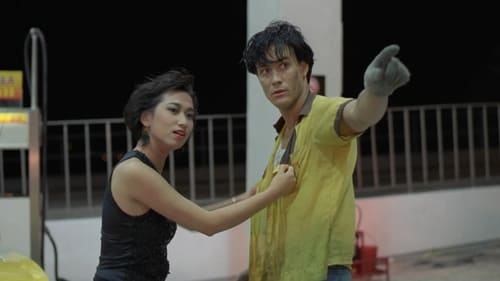
Judge C. K. Lau
After scoring a massive HK$20 million at the box office with the hit comedy Her Fatal Ways in 1990, the golden trio of Tony Leung Ka Fai, Carol Cheng ("Dodo"), and Alfred Cheung returned later that year with another winner in Queen's Bench III. Besides writing, directing, and producing, the talented Alfred Cheung also starred in the courtroom drama as Chang, an aspiring young lawyer who takes on the tricky case of defending for Fai (Tony Leung), a man charged with murdering a girl in the woods. Chang believes that Fai is innocent, but can he save the man and nail the real culprit with the treacherous prosecutor Fang (screen villain Sunny Fang Kang) on the opposing side? Luckily, Chang gets some help from Carrie Ng as a fellow lawyer, Carina Lau as Fai's girlfriend and a witness, and Dodo who makes a cameo appearance as Chang's aunt.

Mr Wong
Brandon plays Brandon Ma, a regular working Joe who holds down two jobs, so he can support his girlfriend May and his dream of owning a motorcycle. Brandon's best friend is Michael, an ambitious and murderous dope peddler. Michael covets May and so he comes up with a plan that will win her for him, and solves a problem he's been having. It seems that an undercover cop named Sharky has been using his police connections to dominate the local cocaine trade, so Michael has him killed and uses Brandon as the fall guy. Brandon goes to jail, though he thinks that he will be released soon thanks to the efforts of his good buddy Michael. Eight years later Brandon finally gets out of jail and vows revenge.

Yin's father
Yuk Yin's father dies and her mother remarries to settle the debts. Yuk Yin lives with Auntie Wong. From then on, Chi Hung, Auntie Wong's son and Yuk Yin live and play together. But the Wongs move away. Yuk Yin stays with her mother. Her stepfather is mercenary. When Yuk Yin grows up, he pushes her to get married to get money. Considering her daughter's future, Yuk Yin's mother sends her away. Yuk Yin works in a restaurant. When she learns that her mother is ill, she marries a dying rich young man to get money for her mother's treatment. After her mother's death, Yuk Yin gets married immediately, but her husband dies on the wedding night. Her mother-in-law sees this as unauspicious and expels Yuk Yin. Later, Yuk Yin chances upon Chi Hung. They are still in love. They married and have a son Kwok Wah. But Chi Hung dies. Yuk Yin works as a dance girl to support their living. Kwok Wah grows up and cannot accept his mother's job. But soon he understands that she is respectable.

Principal
Cheung framed Chan For. Chan orders his wife not to tell this to their children, Ah Lan and Hung. His wife passes away. On her deathbed, she asked a neighbour, To Chung-man, to take care of her children. Claiming to be a good friend of their father, Chan For moves in to the bed next to Ah Lan to take care of his children. Hung likes this uncle because he always treats him generously. But Ah Lan finds "Uncle For" weird and enthusiastic. Ah Lan is forced to pay her mother's debt. Hung is suffering from acute appendicitis. To solve Ah Lan's financial problem, Chung-man returns to his rich family and accept an arranged marriage. Ah Lan decides to sell herself to the construction site foreman for one night. Chan For wants to stop his daughter from making this deal, so he agrees to work for Cheung again. The next day he carries out a robbery and is caught. Ah Lan and Chung-man visit him in jail, and hold their wedding ceremony in front of him. He looks forward to the days when he returns.

Screenplay
Nikolai Gogol's The Inspector General is a satire play well-known around the world. In the period between the end of World War II and the 1960s, the play was adapted in Hong Kong cinema a total of six times. Director Huang Yu alone adapted it twice, as a Republic era story and a period comedy, respectively. The 1955 Republic era-set film is more faithful to its source material, following a spoiled rich brat who is mistaken as a government inspector in a small town and ends up being wined and dined by a corrupted local official. The film pokes fun at the ugliness of bureaucracy in old society, calling back to renowned Qing Dynasty novel Officialdom Unmasked while keeping the original play's artistic style.

Leung Kwong
A prodigal son is married to a woman his mother dislikes. The wife is then expelled from the family circle and forced to become independent.




